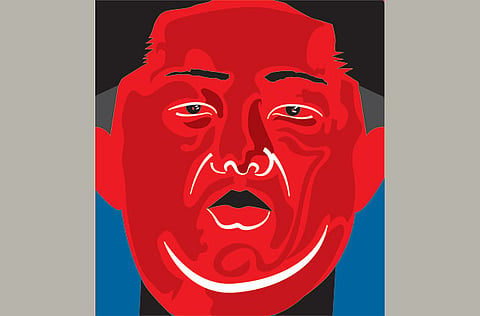Shifting the status quo in North Korea
Kim’s hints of reform offer little hope for North Koreans in the near future

It is a mug’s game trying to interpret the propaganda coming out of North Korea. One minute Pyongyang is about to turn Seoul into a sea of fire, the next it wants to smother it in brotherly love. Away from the rhetoric, the only constants are the Kim dynasty’s reign, now in its 65th year, and the relentless determination to build missiles and nuclear-weapons capability.
Still, there has been a flurry of scholarly excitement over Kim Jong-eun’s New Year’s greeting. That was partly because it was delivered at all. Kim’s was the first such address in 19 years. His father, Kim Jong-il, restricted himself to written editorials and broadcast live to the nation only once — just a single sentence at that.
As Evans J.R. Revere of the Brookings Institution puts it, the young, Swiss-educated Kim has skipped his father’s legacy and has instead been “channelling” his grandfather. He has adopted the dress, mannerisms and even the swept-back hairstyle of Kim Il-sung, who led North Korea from 1948.
Not only was Kim Il-sung more popular than his pot-bellied son, he also ruled a more prosperous country, one that prioritised economic development, albeit of the heavy-industry variety. Kim Jong-il, by contrast, pursued a “military-first” policy and presided over terrible famine in the late-1990s.
If the provenance of Kim’s speech looked more promising so, superficially at least, did the content. He repeatedly called for Korean reunification and devoted far more of his address to the economy than the military.
Korea “should wage an all-out struggle to ... build an economic giant and improve the people’s standard of living”, he said. True, he praised the military for its December rocket launch, but he avoided mention of nuclear weapons.
Closer examination showed there was less to be excited about than met the eye. In fact, Kim Jong-il had made similar appeals for reunification and a stronger economy. Nor were Kim’s economic prescriptions exactly inspiring, confined as they were to vapid invocations of “science and technology” and “scrupulous arrangements for economic planning”.
If one cannot hang much hope on Kim’s words, what about his deeds? First, one we must acknowledge how little one knows about what goes on in North Korea. Even the best-informed experts are reduced to piecing together half-snippets of information.
Still, Korea watchers have picked up potentially important developments since Kim assumed his country’s leadership in December 2011. There have been strong suggestions of renewed economic experimentation, with farmers being told they can keep (and presumably sell) 30 per cent of their crop. Production units of as few as four people — in other words a family — are being permitted, says Andrei Lankov, a Korea specialist at Kookmin University, evidence maybe of Chinese-type agricultural reform.
For more than two decades, Lankov has been sternly sceptical about stories of imminent North Korean change. However, a purge of top generals and a new tone of leadership have persuaded him to at least keep an open mind. That Kim has been seen in public with his glamorous young wife and attending a show featuring Disney characters strikes him as more than superficial.
Not everyone has put scepticism on hold. “Let me be blunt,” Victor Cha, a US expert, wrote in Foreign Policy magazine. “The North Korean regime will not change because Little Kim studied in Switzerland, likes Mickey Mouse and has a hot wife.”
Even if he is wrong and Kim is bent on some kind of domestic reform, it does not follow that Pyongyang will moderate its behaviour towards the outside world. Indeed, there are credible fears that it will seek to test the new South Korean government of Park Geun-hye with some military bravado. At heart, North Korea remains an extortionary state. “We haven’t got anything yet. Let’s blow something up,” as one academic puts it.
Still, there are enough interesting noises coming from Pyongyang for us to take note. A change of leadership can move a country in surprising directions as Myanmar shows, even if for every Thein Sein there are half a dozen Bashar Al Assads.
That raises the question of how other countries should respond. Park has already distanced herself from her predecessor Lee Myung-bak, whose tough stance on Pyongyang brought nothing but naked aggression. She has indicated she may be prepared to decouple the supply of food aid from nuclear talks. She has also talked about the possibility of one day holding a summit.
That seems like the right way to go, at least until it becomes clearer what sort of leader Kim really is. The US may also consider, in the words of John Delury at Yonsei University, “unclenching its fist first”. Freezing out North Korea has proved even more of a dead-end than talking.
Engage or punish, either way Kim may not have much to offer in return. Muammar Gaddafi’s message from the grave is that leaders who give up their weapons end up a grizzled corpse. When change does eventually come to North Korea, it is likely to start from within.
— Financial Times



